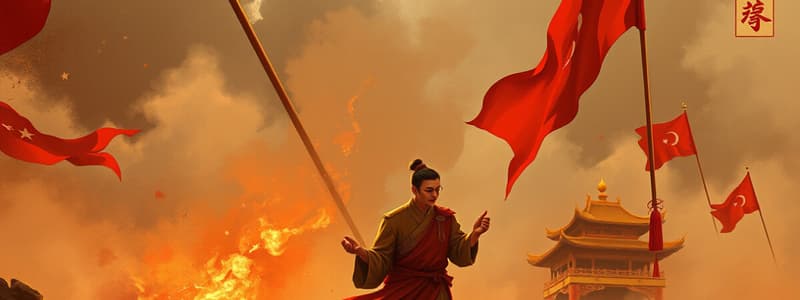Podcast
Questions and Answers
What was the effect on China of the Boxer Rebellion?
What was the effect on China of the Boxer Rebellion?
It led China to the verge of collapse.
What best describes the 'Three Principles of the People'?
What best describes the 'Three Principles of the People'?
Sun Yat-sen's ideas for governing China.
During World War II, what happened between the Communists and Nationalists in China?
During World War II, what happened between the Communists and Nationalists in China?
Both sides agreed to stop fighting each other until World War II ended.
Which were included among the 'Three Principles of the People'? (Select all that apply)
Which were included among the 'Three Principles of the People'? (Select all that apply)
What is the most likely reason Chiang Kai-shek was able to rule as a dictator?
What is the most likely reason Chiang Kai-shek was able to rule as a dictator?
What was most surprising about the outbreak of the Chinese Civil War?
What was most surprising about the outbreak of the Chinese Civil War?
What contributed to the downfall of China's republic?
What contributed to the downfall of China's republic?
Why did support from people in the Chinese countryside help the Communists more than support from people in the cities helped the Nationalists?
Why did support from people in the Chinese countryside help the Communists more than support from people in the cities helped the Nationalists?
Which of the following did the Revolution of 1911 achieve in China? (Select all that apply)
Which of the following did the Revolution of 1911 achieve in China? (Select all that apply)
Why was the Nationalist Party more popular in China's cities than in the countryside?
Why was the Nationalist Party more popular in China's cities than in the countryside?
Flashcards are hidden until you start studying
Study Notes
Effects of the Boxer Rebellion
- The Boxer Rebellion pushed China towards a near collapse.
Three Principles of the People
- Established by Sun Yat-sen, these principles serve as a framework for governing China.
Temporary Truce During World War II
- The Communists and Nationalists agreed to halt their conflict to focus on the external threat of World War II.
Components of the Three Principles
- Socialism and democracy are crucial elements of the "Three Principles of the People."
Chiang Kai-shek's Dictatorship
- Following the chaotic period after the republic's fall, the populace sought a strong leader, enabling Chiang Kai-shek to assume dictatorial power.
Surprising Start of the Chinese Civil War
- The unexpected aspect of the Chinese Civil War was the previous alignment between the Nationalist and Communist parties.
Downfall of the Republic
- The ineffectiveness of China's presidents, due to a lack of real power, contributed to the collapse of the republic.
Rural Support for Communists
- The larger population in rural areas provided the Communists with stronger support compared to the Nationalists, whose backing was primarily urban.
Achievements of the Revolution of 1911
- The Revolution successfully ended imperialist rule in China and established a republic.
Nationalist Popularity in Urban Areas
- Wealthy supporters of the Nationalist Party were primarily located in cities, leading to higher popularity in those regions compared to the countryside.
Studying That Suits You
Use AI to generate personalized quizzes and flashcards to suit your learning preferences.


